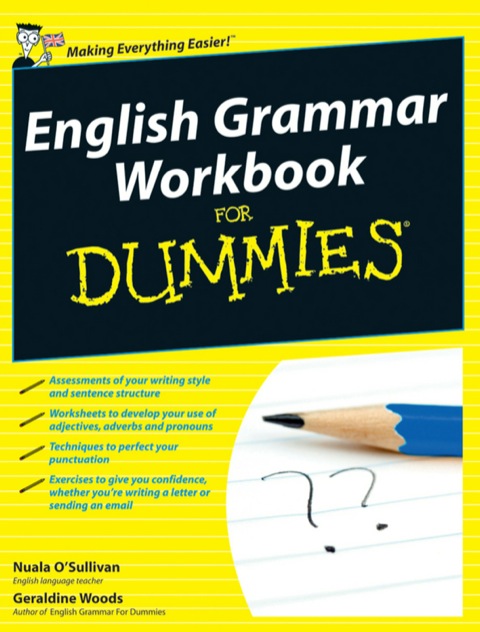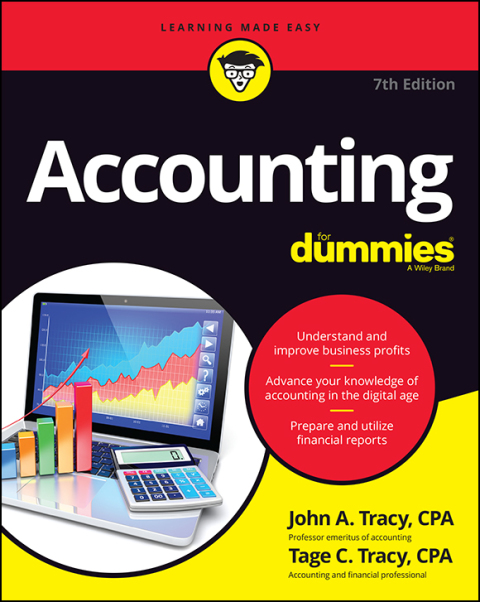Description
Efnisyfirlit
- English Grammar Workbook For Dummies
- About the Authors
- Dedication
- Authors’ Acknowledgments
- Contents at a Glance
- Table of Contents
- Introduction
- About This Book
- Conventions Used in This Book
- Foolish Assumptions
- How This Book Is Organised
- Part I: Laying the Foundations: Grammar Basics
- Part II: Mastering Mechanics
- Part III: The Pickier Points of Correct Verb and Pronoun Use
- Part IV: All You Need to Know about Descriptions and Comparisons
- Part V: Writing with Style
- Part VI: The Part of Tens
- Icons Used in This Book
- Where to Go from Here
- Part I Laying the Foundations: Grammar Basics
- Chapter 1 Placing the Proper Verb in the Proper Place
- Choosing Past, Present or Future
- Shining a Light on Perfect Tenses
- Navigating the Irregular Forms
- Mastering the Two Most Common Irregulars: Be and Have
- Getting By with a Little Help from Some Other Verbs
- Extra Practice with Verbs
- Answers to Problems on Verbs and Verb Tenses
- Chapter 2 Matchmaker, Make Me a Match: Pairing Subjects and Verbs Correctly
- Coping When One Just Isn’t Enough: Plural Nouns
- Bringing Together Subjects and Verbs
- Taming the Terrible Twos: Difficult Subjects to Match with Verbs
- Brain Strain: Extra Practice with Hitching Subjects and Verbs
- Answers to Subject and Verb Pairing Problems
- Chapter 3 Who Is She, and What Is It? The Lowdown on Pronouns
- Separating Singular and Plural Pronouns
- Taking Possession of the Right Pronoun
- Discovering that it’s All in the Details: Possessives versus Contractions
- Avoiding Double Meanings
- Brain Strain: Extra Practice with Basic Pronouns
- Answers to Pronoun Problems
- Chapter 4 Finishing What You Start: Writing Complete Sentences
- Seeking Out the Subject/Verb Pair
- Checking for Complete Thoughts
- Going for Flow: Joining Sentences Correctly
- Finishing with Flair: Choosing Endmarks
- Complete or Incomplete? That Is the Question
- Brain Strain: Extra Practice with Complete Sentences
- Answers to Complete Sentence Problems
- Part II Mastering Mechanics
- Chapter 5 Exercising Comma Sense
- Making a List and Checking It Twice
- You Talkin’ to Me? Direct Address
- Dating and Addressing
- Introducing (and Interrupting) with the Comma
- Setting Off Descriptions
- Brain Strain: Extra Practice with Commas
- Answers to Comma Problems
- Chapter 6 Made You Look! Punctuation Marks That Demand Attention
- Connectors and Dividers: Hyphens
- Just Dashing Through
- Sorting Out Semicolons
- Placing Colons
- Brain Strain: Extra Practice with Hyphens, Dashes, Colons, and Semicolons
- Answers to Punctuation Problems
- Chapter 7 One Small Mark, a Whole New Meaning: Apostrophes
- Putting Words on a Diet: Contractions
- Taking Possession
- Brain Strain: Extra Practice with Apostrophes
- Answers to Apostrophe Problems
- Chapter 8 ‘Let Me Speak!’ Quotation Marks
- Giving Written Words a Voice: Punctuating Direct Quotations
- Embedding One Quotation inside Another
- Punctuating Titles
- Brain Strain: Extra Practice with Quotation Marks
- Answers to Quotation Problems
- Chapter 9 Hitting the Big Time: Capital Letters
- Bowing to Convention and Etiquette: People’s Names and Titles
- Entering the Worlds of Business and Education
- Capitalising Titles of Literary and Media Works
- Placing Geographical Capitals
- Tackling Abbreviations: AM or p.m.?
- Brain Strain: Extra Practice with Capital Letters
- Answers to Capitalisation Problems
- Part III The Pickier Points of Correct Verb and Pronoun Use
- Chapter 10 The Case of It (And Other Pronouns)
- Meeting the Subject at Hand and the Object of My Affection
- Choosing Between ‘Who’ and ‘Whom’
- Linking Up with Pronounsin ‘To Be’ Sentences
- Discovering Whether You’re Talking to Meor I: Pronouns as Objects of Prepositions
- Matching Possessive Pronounsto ‘-ing’ Nouns
- Brain Strain: Extra Practice with Pronoun Case
- Answers to Pronoun Case Problems
- Chapter 11 Choosing the Best Pronoun for a Tricky Sentence
- Nodding in Agreement: Pronouns and Possessives Come Head to Head
- Tackling Pronouns for Companies and Organisations
- Decoding Who, That and Which
- Getting Down to Specifics: Avoiding Improper Pronoun References
- Brain Strain: Extra Practice with Tricky Pronoun Situations
- Answers to Advanced Pronoun Problems
- Chapter 12 Travelling in Time: Tricky Verb Tense Situations
- Telling Tales of the Past
- Communicating When You’re Stuck in the Present
- Tackling the Timeline: Verbals to the Rescue
- Brain Strain: Extra Practice with Verb Tenses
- Answers to Advanced Verb Tense Problems
- Chapter 13 Getting Your Verbs in the Right Mood
- Stating the Obvious: Indicative Mood
- Taking Command: Imperative Mood
- Telling Lies or Being Passive: Subjunctive Mood
- Brain Strain: Extra Practice with Moody Verbs
- Answers to Verb Mood Problems
- Part IV All You Need to Know about Descriptions and Comparisons
- Chapter 14 Writing Good or Well: Adjectives, Adverbs and Articles
- Distinguishing Between Adjectives and Adverbs
- Asking How It’s Going: Choosing Between Good/Well and Bad/Badly
- Mastering the Art of Articles
- Brain Strain: Extra Practice with Descriptors
- Answers to Adjective and Adverb Problems
- Chapter 15 Going on Location: Placing Descriptions Correctly
- Situating ‘Even’, ‘Only’ and Similar Words: Little Words Mean a Lot
- Avoiding Misplaced Descriptions: It Must Be Here Somewhere!
- Hanging off a Cliff: Dangling Descriptions
- Being Dazed and Confused: Vague Descriptions
- Brain Strain: Extra Practice Placing Descriptions
- Answers to Description Placement Problems
- Chapter 16 Forming Comparisons: For Better or Worse
- Visiting the -ER (and the -EST): Creating Comparisons
- Going from Bad to Worse (and Good to Better): Irregular Comparisons
- Using Words That Are Incomparable (Like You!)
- Brain Strain: Extra Practice with Bad Comparisons
- Answers to Comparison Problems
- Chapter 17 Apples and Oranges: Improper Comparisons
- Ensuring That You Complete Comparisons: No One Likes to Feel Incomplete
- Being Smarter Than Yourself: Illogical Comparisons
- Doubling Up Trouble: A Sentence Containing More Than One Comparison
- Brain Strain: Extra Practice with Improper Comparisons
- Answers to Complicated Comparison Problems
- Part V Writing with Style
- Chapter 18 Practising Parallel Structure
- Understanding When Geometry Invades English: Parallelism Basics
- Avoiding Unnecessary Shifts in Tense, Person and Voice
- Matchmaking – The Basics: Either/Or, Not Only/But Also and Similar Pairs
- Brain Strain: Extra Practice with Parallels
- Answers to Parallelism Problems
- Chapter 19 Spicing Up and Trimming Down Your Sentences
- Beginning with a Bang: Adding Introductory Elements
- Smoothing Out Choppy Sentences
- Being Awkward but Interesting: Reversed Sentence Patterns
- Shedding and Eliminating Redundancy
- Brain Strain: Extra Practice Honing Your Sentences
- Answers to Sentence Improvement Problems
- Chapter 20 Steering Clear of Tricky Word Traps
- Separating Almost-Twins: Commonly Confused Words
- Comparing Quantities without Numbers
- Bursting Your Bubble: Sorry, but Some Common Expressions Are Wrong
- Tackling Verbs That Give You a Headache
- Combining Rightfully Independent Words
- Brain Strain: Extra Practice with Tricky Words
- Answers to Tricky Word Problems
- Part VI The Part of Tens
- Chapter 21 Ten Overcorrections
- Substituting ‘Whom’ for ‘Who’
- Inserting Unnecessary ‘Hads’
- Repeating Again and Again
- Sending ‘I’ to Do a ‘Me’ Job
- Speaking or Writing Passively
- Making Sentence Structure Too Complicated
- Letting Descriptions Dangle
- Becoming Allergic to ‘They’ and ‘Their’
- Being Semi-Attached to Semicolons
- Not Knowing When Enough Is Enough
- Chapter 22 Ten Errors to Avoid at All Costs
- Writing Incomplete Sentences
- Letting Sentences Run On and On
- Forgetting to Capitalise ‘I’
- Being Stingy with Quotation Marks
- Using Pronouns Incorrectly
- Placing New Words in the Wrong Context
- Letting Slang Seep into Your Speech
- Forgetting to Proofread
- Relying on Computer Checks for Grammar and Spelling
- Repeating Yourself
- Appendix Your Final Challenge
- Exercise One
- Exercise Two
- Exercise Three
- Exercise Four
- Answers to Exercise One
- Answers to Exercise Two
- Answers to Exercise Three
- Answers to Exercise Four
- Index
- Adevrt






Reviews
There are no reviews yet.